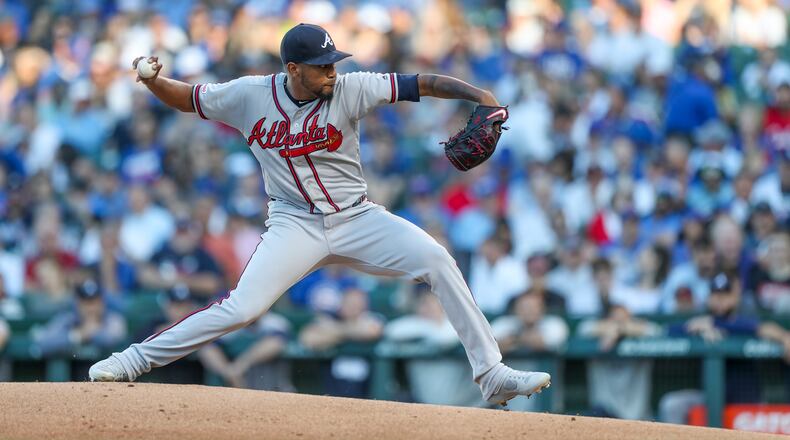Of the several reasons the Atlanta Braves were moved to pay $13 million for a few months of Dallas Keuchel, the notion of Julio Teheran as No. 2 starter was chief among them. This isn't so much a knock against Teheran, who is – borrowing from Bill Belichick, though Popeye the Sailor Man kind of got there first – what he is. But we say it again: If Teheran is your second-best starting pitcher, you better find more starting pitchers.
Beginning May 5, Teheran strung together eight consecutive solid starts: Half of them saw him yield a single earned run; the other half saw him yield no earned runs. He fulfilled a starting pitcher’s mission, which is to give his team a chance to win, and sure enough his team won seven times in eight. And yet, even as he was doing it, you had to wonder how long the latter-day Teheran Method would hold.
In none of the eight starts did he work longer than six innings. In seven of the eight he threw at least 94 pitches. He wasn’t being hit hard – he went 42-2/3 innings without yielding a home run – but he walked 22 over those eight starts, which is a high total for a finesse pitcher, which is what Teheran has become.
The nice little run ended last week against the Mets, who are an unmitigated mess: Teheran allowed 11 baserunners and six earned runs in four innings. Matters worsened last night at Wrigley Field: Teheran recorded 12 outs while generating 13 baserunners and was lucky to surrender only seven earned runs. The Cubs’ first, second and fourth innings included double plays.
Yes, even great pitchers will have a bad start or two, but the past two games would seem to underscore the inherent peril of pitching with men on base. You can get away with it for a while; you can’t get away with it forever. Even after surrendering 13 earned runs in two starts, Teheran’s ERA of 3.98 is more than passable. His peripherals, alas, are scary.
Among qualifying National League starters, he’s third-worst in walks per nine innings. He’s eighth-worst in ground-ball percentage, which suggests his homerless streak might have been a fluke. He’s fifth-worst in Fielding Independent Pitching, which FanGraphs defines as “what a player’s ERA would look like over a given period of time if the pitcher were to have experienced league average results on balls in play and league average timing.” He’s worst in xFIP, which – FanGraphs again – “replaces a pitcher’s home run total with an estimate of how many home runs they SHOULD have allowed given the number of fly balls they have surrendered.”
The belief here has long been that the Braves will again win the National League East for the simple reason that they’re the best team. The one thing that could compromise that is – no, it’s no longer the bullpen, which keeps ticking upward – but a rotational breakdown.
Kevin Gausman has, ahem, plantar fasciitis. Sean Newcomb could become the closer soon. Kyle Wright was just summoned from Gwinnett, where his ERA was 6.08. Max Fried, who’s 25, seems to have stabilized, but this is his first time in a big-league rotation. Mike Soroka, who’s 21, is on pace to work 161 innings, which would constitute his heaviest load as a pro. Mike Foltynewicz was just demoted. Keuchel just arrived.
We saw last year just how much depth mattered. The NL’s division winners were the Braves, the Brewers and the Dodgers. Over 162 games, they deployed 13, 11 and 11 starting pitchers. This year’s Braves aren’t quite to the halfway mark, and they’ve already used 10.
The famous Bostonian Bob Ryan told me back in the ’70s that the most important stat in baseball was innings pitched. There are many more exotic gauges today, but the power of IP hasn’t faded. The team that works the most good innings is the team that finishes first. (I seem to remember a team finishing first over 14 consecutive completed seasons. I also remember it having pretty fair starting pitching.)
Given the outlay for Keuchel, the Braves’ deadline shopping figures to involve adding relievers, which is what every contender does every July. Still, the icebergs regarding this rotation remain. The Braves hold the NL’s second-best record despite having posted the 11th-best ERA among starting pitchers. That’s not sustainable over a six-month season.
With Folty’s flameout and Gausman’s sore foot and the youth of Soroka/Fried, the Braves really do need another top-of-the-rotation arm. That description should fit Keuchel, but it might not fit Teheran. If he’s your No. 4 starter, you’re OK. If he’s anything above that, you’re not.
About the Author
The Latest
Featured



